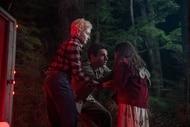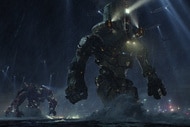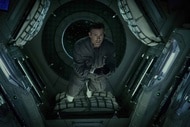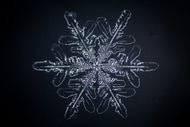NASA/JPL's Moogega Stricker on the Mars 2020 mission and girls in STEM

We’ve been profiling a lot of amazing women in STEM careers here on SYFY FANGRRLS, and today we’re chatting with Moogega Stricker, a planetary protection engineer at NASA/JPL. You might recognize her from the TV series King of the Nerds, as well as the current series How the Universe Works on Discovery.
Stricker told us about the work she does at NASA/JPL and her work on the Mars 2020 mission. We also talked about programs she’s a part of that help encourage young women and kids from underserved communities to get into STEM careers, as well as how she got into science. You can check out her website at moogega.com.
Can you tell everybody what a planetary protection engineer does?
A planetary protection engineer is in charge of ensuring that we don't contaminate the body that we're exploring. So, what I said is very generic, because we have planetary protection engineers assigned to a variety of missions, to include missions to Europa, missions to Mars, and missions to asteroids floating that's around our solar system. So depending on where we're going, the rules change.
My job, for example, I'm the planetary protection lead for the Mars 2020 mission. So the onus is on me to make sure that when we send the rover to Mars somewhere between July and August of 2020, it has a small amount of microorganisms on there. That ensures that when we send it over and it goes to the vacuum of space and those harsh conditions, it doesn't land on Mars and contaminate Mars and change any possible ecosystem that it may have.
And when you're thinking about something like this, are we looking forward with this same sort of idea when we eventually do manned missions?
Exactly. In fact, I would have heated debates with colleagues and friends that say, "Oh, well, based on your job description, doesn't it go away as soon as we send humans there?" Because I always explain humans are cesspools of bacteria, which we need, right? We need the bacteria to help regulate our body and our digestive system and our skin, and it's all necessary. But we're a bag of germs.
So whenever we go somewhere, we're automatically going to contaminate it with our own microbes. But my job is still needed, or something like my job is still needed, because imagine when humans are exploring and cultivating Mars, for example, when other plants and other shipments come to Mars, we need to make sure that it doesn't carry invasive species that may wipe out the supply that they have on Mars. Because if they don't have any food, that's going to be a big problem. So it's similar to what we do here on Earth where we bring products from country to country and we make sure there aren't any weird bugs on it that will wipe out or do negative harm in the new place that those fruits and vegetables are going to.
I wonder if this is even a question you can answer, but what is your day-to-day like?
Yeah, it varies. I'll skip the boring meetings part, [in] which I feel like a professional meeting attender. Essentially it involves attending meetings where we understand what parts of the spacecraft are being put together every day. We have a meeting at 7:00 every morning, and we go through and say, "Okay, every subsystem. Are you putting together something on the cruise stage or descent stage or on the rover?"
And we go and we make sure that planetary protection is there to sample it before they put the pieces together to make sure it's clean enough before they assemble it so that we don't contaminate Mars, eventually. It's a lot of sitting in meetings, understanding we need to sample, going into High Bay, which is this big, huge room that is ultra-clean. Everybody's in bunny suits, and so we go there and we sample the hardware. And then we're also monitoring bakeouts, meaning we put pieces of the hardware in an oven to get it clean. So it's a lot of balancing a bunch of spacecraft parts from different owners to make sure that they're doing the right things to either introduce it into our clean room or put it together in the clean room.
I was just looking at the JPL site and I saw what your dissertation was on in college. Can you talk a little bit about that and then how you went from that to what you're doing now?
Yeah, for undergrad, I studied physics and really got into plasma devices, and for graduate school, I did my whole Ph.D. dissertation on sterilization of spacecraft materials using non-equilibrium atmosphere pressure plasma. Long story short, what that means is, I zapped bugs that are found in weird places with plasma to see if I can kill them. And those bugs, from weird places, represented possible organisms that may come from somewhere outside of our Earth. It's the hardiest of hardy bugs we can find here. I used those as a worst case to see can I sterilize, just in the case if we have a scenario where we need to make sure we contain it for the human safety and human health benefits to make sure we get rid of whatever foreign thing is there.
That's what I did for my Ph.D. The grant was supported by the planetary protection officer at that time, and so it was a really natural segue to work in the field of planetary protection. My Ph.D. research was very mechanical engineering and plasma physics oriented, but I also had to validate my piece of hardware so it's very microbiology-heavy. It was just mastering those two things that led me to my job here at JPL.
You've been at JPL since 2011. Have you seen an increase in the number of women who have been working there since you started?
Oh, yeah. And in fact, I was hired in 2011, but I actually started in January 2010 as a post-doc at first, so I count all of those years. And since I've been here, even when I started, I was so surprised at the team. I worked at the tail end of a MSL, the Curiosity rover. I would go to various meetings and I would talk to subsystem leads, especially the lead of the main part of the rover that had the drill that would acquire the samples, and the person in charge was an amazing, female MIT graduate. Forget the fact that she's male or female, this person is a powerhouse. And also she happens to be a female. She is killing it. There is representation when looking at the people that were in fairly powerful positions. I mean, there were other scientists that were concerned with developing devices and the lead happens to be a female as well. Just all of these women who are empowered at JPL, I was very pleasantly surprised at that profile.
And since then, there's definitely been more, a very diverse group of people that have been hired over time, and a lot of people within our team, the folks that are actually in charge of the tubes, the seals, the critical hardware that's going to touch the Martian surface, they're all women! The tube Cog-E, she's a female. The seal Cog-E is a female. The person in charge of volume assessment station is female. It's crazy.
And of course, there are a lot of men here as well. And could it be better? Obviously, yes. We have a long way to go, but I am very encouraged at the profile that we have here at JPL.
How did you get into science in school?
So, I feel like I've told this story a million times, but it still like sparks joy. [laughs] So I know to keep it because it sparks joy. I was in middle school and we would go to the public library, and I went to the video section because, of course, we get books but also were able to get media, and I went and rented the first VHS of Cosmos. Watching Carl Sagan explain science in a way that I actually could understand, like, "Whoa, now I see what this means." Science felt so unattainable to me and felt I had to be super good at math and science from the get-go, and I was not. I was not good at math and many of my science classes, and that just turned the light bulb on.
All of a sudden my grades went from C's and D's to A's, because I now understood why I needed to learn all of those equations and concepts in math class. Now I understand why it actually means something. So yeah, that helps as far as kids in school. If you are waiting for your light bulb moment, don't worry, it will come. And once the light bulb turns on, then the world will kind of make more sense to you.
The place I first saw you was on King of the Nerds, and I think that's a really cool thing because we were just starting to see women in these roles publicly. What was it like doing that show, and what have you found has been sort of a lasting effect?
Yeah, I'm forever grateful for that show because, since that time, even Curtis [Armstrong] is just integral to many of the great things that have happened to me. Curtis is just my second dad in a way, you know? He's just an angel. He's adopted all of this nerdlings from the show, from all seasons, but also it opened up opportunities. There was a key person in the art department and he recruited me for another show that was funded by National Geographic to kind of do some science and engineering consulting. And since then, I also did another consulting project, on camera now, with Discovery Channel and it's been now, I think, three or four seasons that I've been on since then, on camera, speaking as an expert about various general space topics.
And so it's led to all of these opportunities, and I'm just eternally grateful because I would ask, "Hey, where did you find me?" And the person that found me for this How the Universe Works show said, "Oh yeah, I was in the UK and I saw King of the Nerds, and I thought you'd be a good part." I'm like, “What!" So it's been amazing.
Are you taking part in any sort of projects encouraging girls to go into STEM careers?
Yeah, so I was very fortunate to be just loosely involved in a few programs. There's one that was called Project Scientist. And it was specifically focused on girls from pre-K age through early middle school. It was just amazing going and talking to them at Caltech over the summer and just giving them a little lecture and interacting with them and just seeing the light bulbs turn on. I've also organized a mini JPL day at the Children’s Institute Inc. who is focused on serving the underrepresented community. So, it's not just focused on getting more women in science or young girls in science, but just people from underrepresented communities, both girls and boys. I recruited other people from JPL to talk about their work on the mission next to a huge life-sized blow-up rover, and bring little pencil rockets for them to make. All of these things are done in hopes to get them to be future engineers and scientists.
What advice would you have for young women or people from underrepresented communities that want to get into science but really aren't sure what career path to go down?
Yeah, I would say just start exploring and seeing what you like. There are so many different fields within science and engineering, and if you feel like in your heart of hearts that you want to be a scientist or an engineer, but you just haven't found your niche, keep trying it out. Try one thing. If you don't like it, that's okay. Try something else. There are so many different forms of engineering. There's mechanical, electrical, chemical. I mean there are so many nuances, so just keep trying and especially when you get up into college age, go participate in internships, get experience and really don't take failure as an ultimate failure. Right? It's just something that you've learned. You always learn something from failure and it gets you closer to the path you're supposed to be on.
I was just on your Twitter profile, and I know you have “triathlete by night” on there.
Yeah, I feel bad because I'm so not as active as I used to be. But I very recently ... maybe like four or five or six years ago, I did not know how to ride a bike or swim. And I talked to people who were like, "Oh, I don't know how to swim either." I was like, "You can tread water so you won't die. I will die if you throw me in a body of water." And for the bike, I like legit even to this day have very, very poor bike handling skills. But I used triathloning to force me to learn.
At first, I was just so anti-triathlon, and I had people in my life that would push and question, "Well, why? Why don't you do it? Oh, you don't know how to swim? Why don't you know how to swim? And why don't you know..." "I don't have a bike." "Well, I can let you borrow my bike." So they allowed me to not have excuses and I really love that. So eventually I learned and I went all the way up to Half Ironman. Yeah. So it's like 70.3 miles where you rely on your own body power. But again, it's funny after all of that, I still can't tread water so I can freestyle swim to the edge to save my life. And my bike handling skills are so bad, but I can still bike 56 miles.
That's pretty impressive.
Still don't do any hairpin turns. I will die.
Tell us a little bit about some of your fandoms. What sort of geek shows and movies are you into?
Oh man. Let's see. I used to watch Futurama like the OG Futurama, not the recent ones. It sounds so like snooty. Futurama and Bob's Burgers obviously is an amazing show. Ru Paul’s Drag Race also gives me life! I watch a few TV shows here and there.
But yeah, in my spare time I just really like fitness and active things that bring me outside or connect me to people. Just TV and activity outside, and outreach are my three big fandoms in a sense. I really just nerd out on certain shows.
You can follow Moogega Stricker on Twitter @Moogega.




























